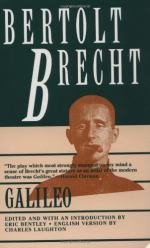|
This section contains 1,685 words (approx. 6 pages at 300 words per page) |

|
Mathematician, astronomer, and natural philosopher, Galileo Galilei (1564–1642), who was born the same year as William Shakespeare in Pisa, Italy, on February 15, contributed fundamentally to the scientific revolution of the sixteenth and seventeenth centuries in which Ptolemaic geocentric cosmology and Aristotelian were successfully challenged by Copernican heliocentric cosmology and a new science of motion. Galileo's participation in the astronomical revolution included the best-known cases of his technological innovation and ethical/religious conflict, namely, his application of the telescope as an astronomical instrument and his engagement with the Roman Catholic Church over matters of biblical interpretation and the Copernican hypothesis. He died on January 8 in Arcetri near Florence where he was living under house arrest that had been imposed following his conflict with the church.
Natural Philosopher and Inventor
Galileo's career as a natural philosopher involved an ongoing study of natural motion, especially inertial motion and that of...
|
This section contains 1,685 words (approx. 6 pages at 300 words per page) |

|


